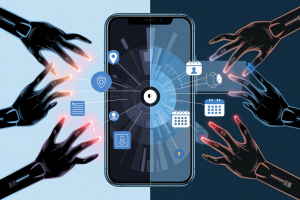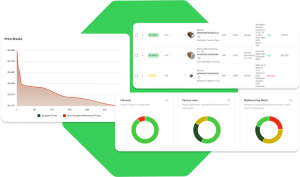Is The Enterprise Killing Blackberry – Are They Missing The Mobile Revolution?
Firms in the enterprise market can be divided into two kinds — very large enterprises with particular compliance requirements and smaller enterprises in which internal policing is lax.
Research In Motion’s BlackBerry dominates the compliance-sensitive, large-enterprise market with essentially 100% market share. The reason for this is relatively simple: BlackBerry has a consistent record of catering to the needs of these companies. What are those needs? They all revolve around security and manageability, but most specifically they revolve around the compliance department and legal exposure.
A large compliance-sensitive enterprise that needs to protect itself against lawsuits needs to police its employees hard. It needs to ensure that the smartphone isn’t used for trivial matters such as social networking, entertainment and games, just to mention some red flags. Basically, if you can’t do it on your work PC while in the office, you shouldn’t be able to do it on your enterprise-provided smartphone.
While it may take some time for the other platforms to match BlackBerry in the policy-enforcement, security and manageability aspects of enterprise needs, BlackBerry faces other threats along the way. Skyrocketing unemployment is one obvious problem. Old BlackBerry devices get recycled in the enterprise, and the employee joining the unemployment ranks often gets an iPhone from Apple, Google’s Android or sometimes even a Palm.
Perhaps the greatest threat to BlackBerry is that its enterprise users often are stuck with two-year-old devices that are outdated in their capabilities. They don’t have the new 360×480 screen resolution or 256 megabytes of memory, and therefore they can’t hold or run many interesting apps. Comparing a two-year-old BlackBerry with a brand new iPhone or Android device isn’t a fair comparison, but that’s the comparison that people often make.
Technically, BlackBerry’s newest devices, such as the 9700 Bold, are very competitive in most areas, but people are frustrated with their experiences with their old BlackBerry in the enterprise environment, causing them to “lash out” in favor of iPhone and Android. This is a calamity RIM must fight with facts and education, not with a completely useless “Love what you do” advertising campaign that was so generic that it could have applied to almost any kind of item in life.
Thankfully, RIM is getting closer to plugging some of its technological challenges. The new WebKit browser should be available as early as the June calendar quarter, although the timing could slip by a few months. The device memory will be bumped shortly from 256MB to 512MB, although frankly, a much bigger boost is needed.
New touch-screens will become available some time before the end of 2010. Two-way cameras enabling videoconferencing will likely hit the BlackBerry within the year. One could only hope for MiFi-type functionality and a WiMax version for Sprint and Clearwire before December.
So what’s the competition like? Apple has made strong headway with the iPhone, plugging some security holes last June with the encrypted 3GS. Some enterprises are starting to allow it, although far from a majority just yet. Still, as of right now, Apple is the most credible threat to RIM in the enterprise, as unlikely as that would have seemed even a year ago.
Google is basically nowhere with Android in the enterprise, but this won’t remain forever. Expect a traditional BlackBerry form factor, where there is a keyboard but it’s not a slider keyboard, to become available in the next few short months from companies such as Taiwan’s HTC, in particular. That said, Google’s less-than-stellar reputation in the privacy department (Buzz comes to mind) will make the enterprise market a tough sell.
Microsoft(MSFT) has been the most credible competition to BlackBerry on pure technical merits, with great Exchange/Outlook integration. The problem has been in the ease-of-use department, and with crummy hardware. Interestingly, just when Microsoft was ready to close those gaps with BlackBerry, it launched the Series 7 Phone, which is 100% focused on the consumer, and not at all on the enterprise. As it stands, no enterprise would consider a Microsoft Series 7 Phone, which is set to become available by the fourth quarter.
This shift in focus also meant that Microsoft committed suicide in the smartphone enterprise market, because nobody believes that Microsoft will focus on its current 6.5 platform anymore.
As for Palm and Nokia with its Symbian, those competitors are essentially non-factors in the U.S. enterprise market.
The bottom line is that BlackBerry continues to reign supreme in many of the enterprise segments, but the clock is ticking. It needs to quickly adopt the best technological capabilities of the other platforms, such as iPhone, Android and Palm, before market share-losses become material. This race against the clock will play itself out, at least in terms of the critical mind share, in 2010, not in 2011.
A message from John Furrier, co-founder of SiliconANGLE:
Your vote of support is important to us and it helps us keep the content FREE.
One click below supports our mission to provide free, deep, and relevant content.
Join our community on YouTube
Join the community that includes more than 15,000 #CubeAlumni experts, including Amazon.com CEO Andy Jassy, Dell Technologies founder and CEO Michael Dell, Intel CEO Pat Gelsinger, and many more luminaries and experts.
THANK YOU









